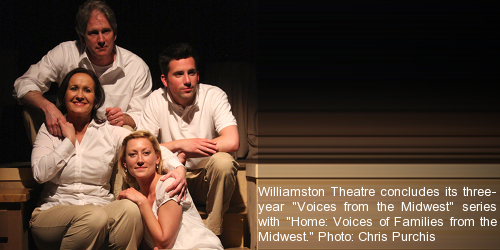By Bridgette M. Redman

There are some words that defy easy definition. "Home" is one of them and "Midwest" is another. But while they are concepts that resist being nailed down accurately to simplistic sound bites, they make for excellent exploration on the stage.
"Home: Voices of Families from the Midwest" is the final installment of a three-play series created by Williamston Theater. Suzi Regan and Annie Martin — the playwrights of the first in the series, "Maidens, Mothers and Crones: Voices of Women from the Midwest" — collaborated to create this evening of vignettes that dances the line between play and musical.
Like their first play, the characters and situations in "Home" seem less about the Midwest in specific and more universal in scope. Yet, it is that layer that serves to remind audiences that Midwesterners truly aren't that different from people in the rest of the world.
"Home," like the others in the series, is structured as a series of vignettes with new characters populating new situations every time a scene changes. While it bears this structural similarity, "Home" is easily the most mature of the series, reaching a new level of sophistication with its integration of music and its heavy use of symbolism in the characters, words and set.
Perhaps because Regan and Martin are dealing with topics that evoke so many different emotions, the symbolism is able to effectively replace plot and limited story arc. For "Home" is more a series of portraits — family snapshots taken to capture a memory rather than to tell a story. The snapshots spark memories, recollections of events, peoples and feelings that are different for each person looking at it.
Regan directs a cast of four powerhouse actors made up of veterans and Michigan State University students. Williamston audiences have already been treated to the acting prowess of Sandra Birch, John Lepard and Maggie Meyer, and "Home" introduces them to actor Hazen Cuyler and guitarist Nick Hinz.
Hinz, while having the fewest lines, is the only performer who stays on stage the entire time, perched in a treehouse in the family's backyard. He observes, sings and introduces each scene by telling us who the family is and where they live. This latter device eased the transitions for audience members unfamiliar with the structure and let them more quickly fall into the show's rhythm and scene shifts.
Hinz is also the sole instrumental accompaniment to the original music by Regan and Martin, music which both sets the mood and occasionally serves as its own scene such as when Birch and Meyer play an antagonistic step-mother/step-daughter pair while Lepard's husband/father remains oblivious, singing his assertion that his "girls" get along so well. It also allowed for very quick transitions such as the segment where the actors quickly cycled through a series of different dinner tables, separating each one by singing the chorus of "dinner time."
While it would be impossible for all types of families to be portrayed in a two-hour time frame, the playwrights mange to draw from a variety of situations. Families included the traditional married couple with two kids, single parents, a mother struggling to accept her gay son, a curmudgeonly neighbor adopting a younger couple, siblings and even a babysitter.
Unlike the second in the series, "Flyover USA: Voices of Men from the Midwest," this installment had less outright comedy. While there were plenty of laughs, they came more from recognition than outright humor. The show was touching and relatable, filled with moments both loving and painful.
Given the often over-emphasized nature of dysfunction in families on the stage, it was pleasantly surprising that this play was singularly lacking in bitterness. It's not that the playwrights shied away from the topic, but they didn't go for the easy choice. There was mourning and resignation, even anger and shouting, but a delightful lack of bitterness or cynicism. When Birch sings about the loss of a relationship, it is with a repeating chorus in which her character recognizes that she is better for having been loved by the person she has now lost.
It is the relationships between all the characters that truly sells this show. The four actors slip seamlessly between characters while portraying real connection in their relationships. There is an evident trust and affection between these cast members that creates a true sense of family. Even when the lights were down, their expressions indicated they were enjoying every moment of the show.
"Home" triumphantly wraps up this three-season series that celebrates the lives of Midwesterners and what makes them not unique, but what makes them human.
REVIEW:
'Home: Voices of Families from the Midwest'
Williamston Theatre, 122 S. Putnam Rd., Williamston. Thursday-Sunday through June 13. $18-$24. 517-655-7469. http://www.williamstontheatre.org










